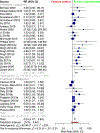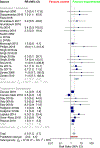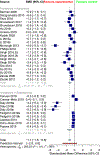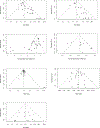Comparative efficacy of racemic ketamine and esketamine for depression: A systematic review and meta-analysis
- PMID: 33022440
- PMCID: PMC7704936
- DOI: 10.1016/j.jad.2020.09.071
Comparative efficacy of racemic ketamine and esketamine for depression: A systematic review and meta-analysis
Erratum in
-
Erratum to "Comparative efficacy of racemic ketamine and esketamine for depression: a systematic review and meta-analysis" [Journal of Affective Disorders 278C (2021) 542-555].J Affect Disord. 2021 Feb 15;281:1001. doi: 10.1016/j.jad.2020.11.103. Epub 2020 Nov 20. J Affect Disord. 2021. PMID: 33229028 No abstract available.
Abstract
Background: Ketamine appears to have a therapeutic role in certain mental disorders, most notably depression. However, the comparative performance of different formulations of ketamine is less clear.
Objectives: This study aimed to assess the comparative efficacy and tolerability of racemic and esketamine for the treatment of unipolar and bipolar major depression.
Design: Systematic review and meta-analysis.
Data sources: We searched PubMed, MEDLINE, Embase, PsycINFO, the Cochrane Central Register of Controlled Clinical Trials, and the Cochrane Database of Systematic Reviews for relevant studies published since database inception and December 17, 2019.
Study eligibility criteria: We considered randomized controlled trials examining racemic or esketamine for the treatment of unipolar or bipolar major depression.
Outcomes: Primary outcomes were response and remission from depression, change in depression severity, suicidality, retention in treatment, drop-outs, and drop-outs due to adverse events.
Analysis: Evidence from randomized controlled trials was synthesized as rate ratios (RRs) for treatment response, disorder remission, adverse events, and withdrawals and as standardized mean differences (SMDs) for change in symptoms, via random-effects meta-analyses.
Findings: 24 trials representing 1877 participants were pooled. Racemic ketamine relative to esketamine demonstrated greater overall response (RR = 3.01 vs. RR = 1.38) and remission rates (RR = 3.70 vs. RR = 1.47), as well as lower dropouts (RR = 0.76 vs. RR = 1.37).
Conclusions: Intravenous ketamine appears to be more efficacious than intranasal esketamine for the treatment of depression.
Keywords: Bipolar disorder; Depression; Depressive disorder; Esketamine; Ketamine; Major; Meta-analysis; Randomized controlled trials.
Copyright © 2020. Published by Elsevier B.V.
Figures






Comment in
-
Response to commentary on the comparative efficacy of esketamine vs. ketamine meta-analysis: Putting the cart before the horse?J Affect Disord. 2021 Mar 1;282:258-260. doi: 10.1016/j.jad.2020.12.069. Epub 2020 Dec 24. J Affect Disord. 2021. PMID: 33418376 Free PMC article. No abstract available.
-
Comments to Drs. Bahji, Vazquez, and Zarate.J Affect Disord. 2021 Mar 15;283:262-264. doi: 10.1016/j.jad.2021.01.046. Epub 2021 Jan 25. J Affect Disord. 2021. PMID: 33571795
-
Letter to the editor - Comparative efficacy of racemic ketamine and esketamine for depression: A systematic review and meta-analysis.J Affect Disord. 2021 Mar 15;283:265-266. doi: 10.1016/j.jad.2021.01.026. Epub 2021 Jan 20. J Affect Disord. 2021. PMID: 33571796 No abstract available.
-
Letter to the Editor: Comparative efficacy of racemic ketamine and esketamine for depression: A systematic review and meta-analysis.J Affect Disord. 2021 Jun 15;289:88-89. doi: 10.1016/j.jad.2021.04.024. Epub 2021 Apr 27. J Affect Disord. 2021. PMID: 33957360 No abstract available.
-
Letter to the editor about "Comparative efficacy of racemic ketamine and esketamine for depression: A systematic review and meta-analysis".J Affect Disord. 2023 Feb 1;322:1. doi: 10.1016/j.jad.2022.10.013. Epub 2022 Oct 18. J Affect Disord. 2023. PMID: 36270446 No abstract available.
-
Response to "Letter to the Editor: Comparative efficacy of racemic ketamine and esketamine for depression: A systematic review and meta-analysis.".J Affect Disord. 2023 Mar 1;324:68. doi: 10.1016/j.jad.2022.12.068. Epub 2022 Dec 24. J Affect Disord. 2023. PMID: 36574849 No abstract available.
References
-
- Arabzadeh S, Hakkikazazi E, Shahmansouri N, Tafakhori A, Ghajar A, Jafarinia M, Akhondzadeh S, 2018. Does oral administration of ketamine accelerate response to treatment in major depressive disorder? Results of a double-blind controlled trial. J. Affect. Disord. 235, 236–241. 10.1016/j.jad.2018.02.056 - DOI - PubMed
Publication types
MeSH terms
Substances
Grants and funding
LinkOut - more resources
Full Text Sources
Other Literature Sources
Medical

